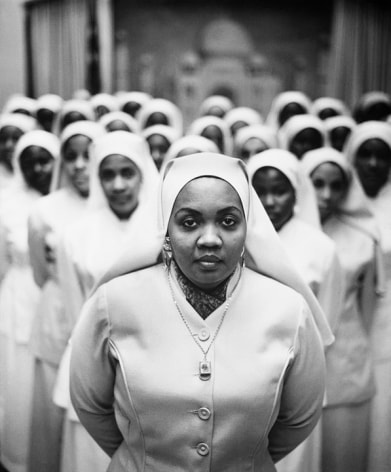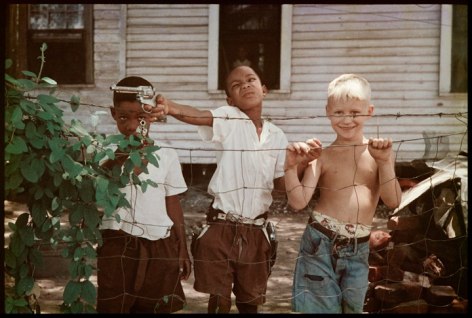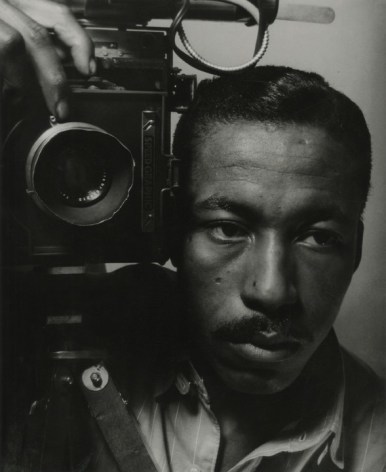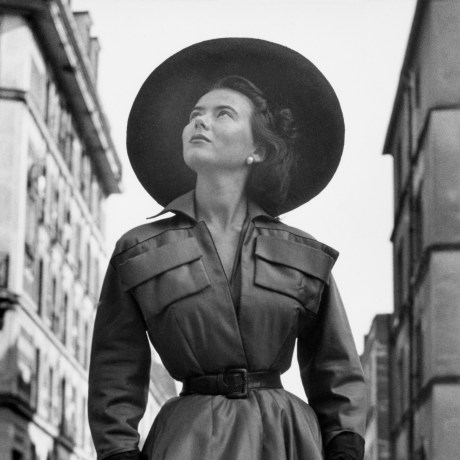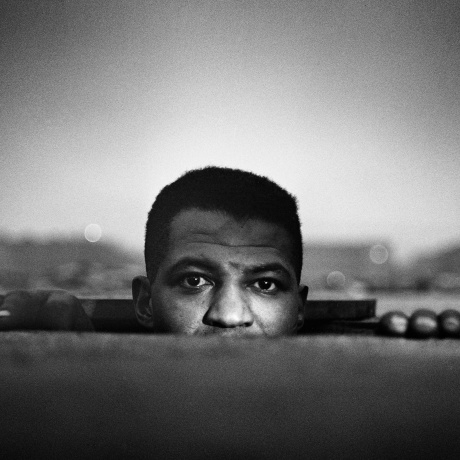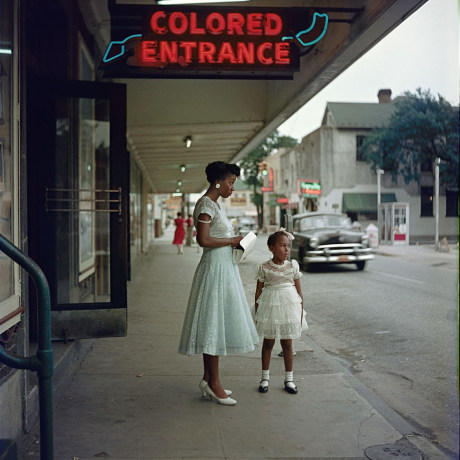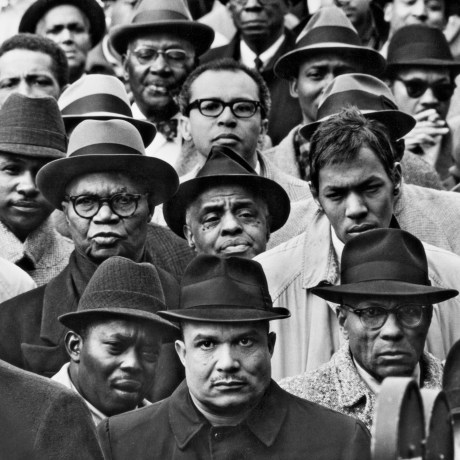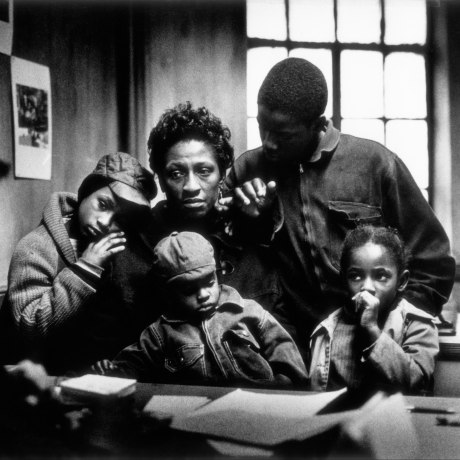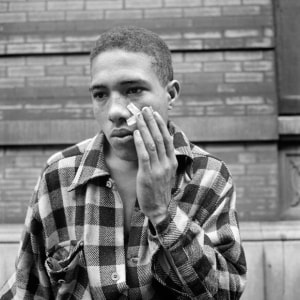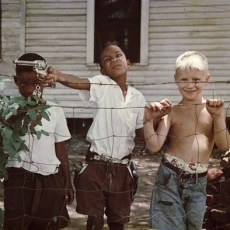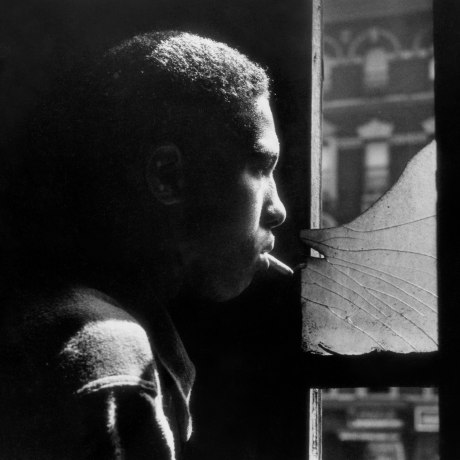
Jenkins Johnson Gallery is pleased to announce Gordon Parks: Legacy; a multi-media exhibition exploring the relationships between the works of Gordon Parks and the works of artists he inspired, collaborated with, and drew inspiration from. The opening reception will be held on Thursday, November 1 from 5:30 pm to 7:30 pm. Gordon Parks: Legacy will be on view through December 9, 2017 and exhibits concurrently with the Berkeley Art Museum & Pacific Film Archive’s presentation of Gordon Parks: The Making of an Argument, on view through December 17, 2017.
Gordon Parks: Legacy features works that inspired contemporary artists, Parks’ contemporaries, and Parks himself. The celebrated new video, ELEMENT, released by recording artist Kendrick Lamar, and the portraiture of renowned South African visual activist Zanele Muholi best known for her Somnyama Ngonyama and Faces and Phases series, are directly inspired by Parks’ body of work. Works from Parks’ 1952 Life Magazine photo-essay A Man Becomes Invisible, a collaborative project with his friend Ralph Ellison, author of the 1953 National Book Award winning novel Invisible Man, will be presented, along with Parks’ compelling filmography Leadbelly, 1976, which chronicles the life of folk and blues musician Huddie “Lead Belly” Ledbetter, who inspired Parks. Parks’ 1968 short film, Diary of a Harlem Family, will be screened continuously, making a striking counterpoint to this year’s ELEMENT. In addition, a film biography detailing Parks’ life, Half Past Autumn: The Life and Works of Gordon Parks, will be screened.
American recording artist Kendrick Lamar’s video Element recasts specific Gordon Parks images of social justice, poverty and politics through a modern lens. Among Parks’ works referenced are: Untitled, Harlem, New York, 1948, portraying gang members fighting (from Parks’ first assignment with Life “The Making of An Argument: A Harlem Gang Leader” 1948); Untitled, Alabama, 1956, depicting children playing with guns; Boy with June Bug, Fort Scott, Kansas, 1963; Ethel Sharrieff, Chicago, Illinois, 1963, a striking formation of women in hijab; and depictions of Nation of Islam members practicing self defense. Lamar’s video also references Parks’ film The Learning Tree (the first Hollywood studio film to be directed by a Black American) as ELEMENT opens with a hand rising out of the water, which resembles the movie’s opening scene.
Zanele Muholi was influenced by Gordon Parks through his powerful use of the camera for social commentary as described by this quote from Parks’ memoir: “I saw that the camera could be a weapon against poverty, against racism, against all sorts of social wrongs. I knew at that point I had to have a camera.” In Gordon Parks: Legacy, Zanele Muholi’s photography highlights stories of the massacres, hate crimes and rapes of black South African Lesbians, Gay, Bisexual, Transgender and Intersex persons. Like Parks was, Muholi is an advocate for human rights, social justice and representation of the Black Body, with her emphasis on those of the LGBTI community in South Africa. Similar to Parks in his lifetime, she risks her life by using photography to confront social injustice. Some of Parks’ images that are echoed in her works include: Self Portrait, 1940; American Gothic, 1942; Department Store, Mobile, Alabama, 1956; Untitled, Trinidad, Cuba, 1958; Untitled, New York, NY, 1963 (Protesters with signage - Murdering Innocent Negroes); Malcolm X Holding Up Black Muslim Newspaper Harlem, New York, 1963; and, Fontenelle Children Outside Their Harlem Tenement, New York, 1967.
Just as Parks’ served to humanize the black existence in America in the 1940s, 50s and 60s, Muholi’s Somnyama Ngonyama and Faces and Phases series serves to humanize the daily lives of the LGBTI community from 1994 to 2017. Muholi is currently exhibiting in LGBTQI+, the inaugural exhibition of Zeitz MOCAA in Cape Town, South Africa through June 2018; Zanele Muholi: Somnyama Ngonyama, Hail the Dark Lioness at Autograph ABP in London through October 28, 2017; Zanele Muholi at Stedelijk Museum Amsterdam in the Netherlands through October 22, 2017; and, the Lohman Museum of Gay and Lesbian Art in New York City through October 29, 2017.
Film Show Times
Tuesday – Friday
10: 00 am and 2:00 pm LeadBelly - 126 minutes
12:30 pm and 4:30 pm Half Past Autumn: The Life and Works of Gordon Parks - 90 minutes
Throughout the day Diary of a Harlem Family (The Fontenelles) - 20 minutes
Saturday
10:00 am LeadBelly - 126 minutes
12:30 and 3:00 pm Half Past Autumn: The Life and Works of Gordon Parks - 90 minutes
Throughout the day Diary of a Harlem Family (The Fontenelles) - 20 minutes
For more information on this exhibition please contact the gallery at (415) 677-0770 or sf@jenkinsjohnsongallery.com

